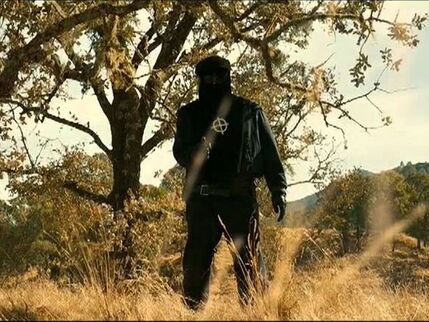B+ | Journalists and detectives obsess over solving the mysterious Zodiac murders in 60's and 70's California. Directed by David Fincher Starring Jake Gyllenhaal, Mark Ruffalo, and Robert Downey Jr Review by Jon Kissel |

Fincher and legendary cinematographer Harris Savides communicate the random brutality of the Zodiac with ruthless precision, laying the groundwork for the Zodiac’s hunters to go after him. Robert Graysmith (Jake Gyllenhaal) and Paul Avery (Robert Downey Jr) both work for the San Francisco Chronicle and detective Dave Toschi (Mark Ruffalo) heads up the police response. Graysmith, a mere cartoonist, starts the farthest away from the case but his interest in puzzles and codes, a medium the Zodiac operates in, draws him away from his caricatures and towards the case, in spite of no one ever asking him to help out. As Avery is worn down by his own vices and Toschi must resign himself to the mystery and eventually move on to other murders, it’s Graysmith who can’t let the Zodiac go. He pesters detectives deep into the 70’s, long after the Zodiac’s believed to have killed anyone else, and, based on Fincher’s tense cinematic language, risks his life in a basement for no discernible reason. Graysmith is asked repeatedly why he’s doing this. It’s not for justice or some tidy response to something that happened to him as a child or anything like that. There’s only the desire to see how the story ends, to justify all the time he’s spent on this by bringing it to a conclusion.
Fincher and screenwriter James Vanderbilt adapted their film from Graysmith’s book about the Zodiac with help from Graysmith himself. That first-hand knowledge pays off in a meticulous and procedural film that has been praised for its accuracy. Everything about the case seems to be here, and it’s so thorough that the viewer gets the impression that if something was left out, as it must have been, there’s a good reason. However, Fincher’s a chilly filmmaker and this is chillier than most. So much of Zodiac is arguments between Graysmith and Toschi about why one lead is valuable and others aren’t. If it gets repetitive, the film has given itself one out by sticking with real events and another by creating an air of authenticity. One’s tolerance for this kind of truthfulness, no matter its cinematic worth or its value as entertainment, may vary.
The three central performances are all well-calibrated to the film’s themes and its professional tone. Gyllenhaal, Downey, and Ruffalo, especially the first two, can be prone to large performances but that’s not the case here. Ruffalo’s Toschi is constrained by his position, and while he might want to be as dedicated as Graysmith is, he has to live in the world. Ruffalo ably communicates that frustration. Gyllenhaal is in his wheelhouse playing a wild-eyed obsessive, though this is the least wild-eyed of those kinds of roles. Downey, on the cusp of his full welcoming back into Hollywood, is my favorite for the same reason Pacino was my favorite in The Irishman. He’s doing the most acting as the flamboyant Avery, but he also goes through the largest and most believable transformation. He starts the film as an ace crime reporter who’s holding court in the journalist bars every night, and finishes it as a tortured and resentful washout bounced out from his major newspaper into the sticks. Even after a dozen Marvel films and the other jobs he’s taken in the interim, this is the best thing Downey’s done since he put the drugs away.
A wide-ranging film that spans years requires the cast to build its world out. Despite his reputation for torturing actors on his sets with endless takes, Fincher repeatedly get great performances from those at the top of the call sheet all the way down. Zodiac contains zero false notes or Waitress #2 bit roles phoning it in. The aforementioned victims are all great in roles demanding a dawning panic. In the supporting cast, Anthony Edwards is a beacon of decency and competence, taking everything in good humor or at least tolerating it. His slight pushback against Avery’s profanity is the equivalent of a tantrum. As the likeliest culprit, John Carroll Lynch is perfectly cast as Arthur Leigh Allen, a convicted pedophile who goes out of his way to act like a serial killer but who takes care not to leave enough evidence for an arrest. Lynch is one of those actors, alongside the Yellow King from True Detective, who has the look of everyday evil down to a science.
It’s fitting we just watched Hail Satan, because Satanists get a shout-out in Zodiac. Man-on-the-street interviews show that while not everyone is interested in the Zodiac, there are other absurdities for people to be concerned about i.e. Haight-Asbury hippies and Satanists. I don’t think Zodiac ever mentions Vietnam, despite this being, to repeat, a period of high-intensity warfare. Fincher takes a jaundiced eye towards media-hyped distraction, and rejects the kind of happy ending rip-offs that would emerge based on the case. The cousin of Zodiac, Bong Joon-ho’s Memories of Murder, is another fruitless, years-long investigation set against a rapidly changing South Korea. Memories of Murder is mirroring those changes alongside the investigation, while Zodiac is deliberately separating its pursuit of a killer from broader social context. The difference means I slightly prefer Bong’s police story to Fincher’s, but Zodiac’s nothing to sneeze at. This is an intimately-researched document and an atmospheric achievement that is nevertheless only my fifth favorite Fincher. B+
 RSS Feed
RSS Feed